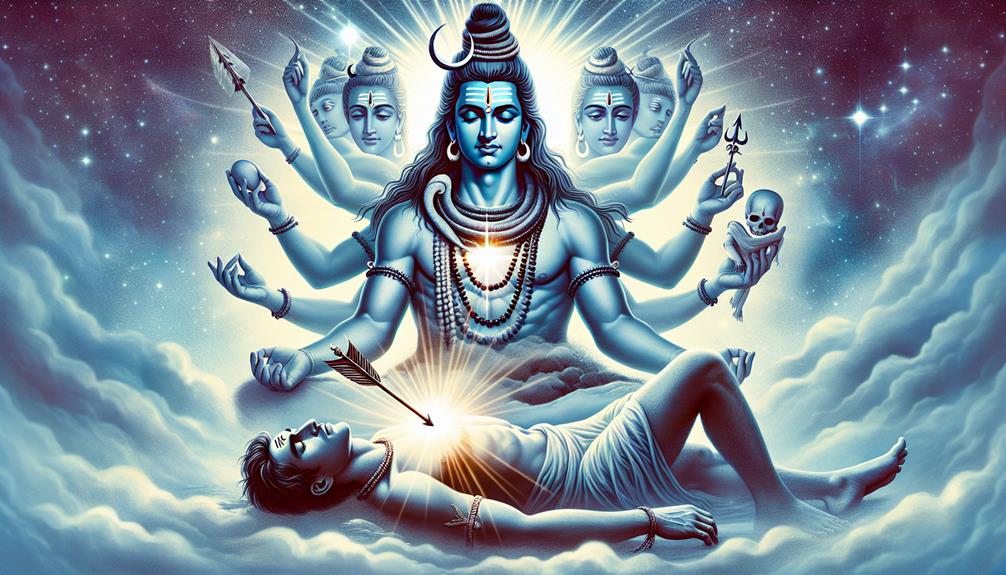Was Kama Killed By Shiva
The ancient tale of Kama's demise at the hands of Shiva has sparked numerous theories and interpretations over the centuries. Was it a deliberate act of destruction or a necessary sacrifice for a greater purpose?
Was Kama Killed By Shiva
As we explore the intricacies of this mythological narrative, we are faced with a web of complexities and contradictions that challenge our understanding of divine intervention and mortal consequences.
Was Kama Killed By Shiva
Join us as we unravel the enigma surrounding Kama's death and delve into the depths of this age-old mystery.
Was Kama Killed By Shiva
Key Takeaways
- Shiva's involvement in Kama's demise is depicted in ancient texts.
- Kama's sacrifice symbolizes the conflict between desire and spiritual growth.
- Various interpretations highlight the complexities of divine forces and mortal desires.
- The legend sparks debates on divine intervention, mortal desires, and the balance of cosmic laws.
The Myth of Kama's Demise
Kama's demise, a pivotal event in Hindu mythology, is surrounded by the enduring question of whether Shiva was responsible for his death. Kama, the god of love, dared to aim his flower-tipped arrow at Shiva, the powerful deity in deep meditation. This act, challenging Shiva's focus, led to an unforeseen consequence. Shiva, disturbed by Kama's interruption, opened his third eye in a surge of divine energy, reducing Kama to ashes. The tale of Kama's demise resonates deeply within Hindu culture, sparking discussions about the balance between love and duty, desire and destiny.
Was Kama Killed By Shiva
The myth of Kama's demise serves as a cautionary tale, reminding believers of the consequences of interfering with cosmic order. It symbolizes the delicate equilibrium between passion and restraint, asserting the supremacy of cosmic laws over individual desires. Through this myth, devotees find solace in accepting the grand design of the universe, seeking harmony within the interconnected web of gods and mortals. Kama's sacrifice, whether at the hands of Shiva's wrath or as a predestined event, underscores the profound mysteries that shape human existence within the divine tapestry of Hindu mythology.
Was Kama Killed By Shiva
Shiva's Role in Kama's Fate
Shiva's involvement in the demise of Kama, the god of love, has sparked ongoing debates within Hindu mythology. The ancient texts depict Shiva as the one responsible for Kama's fate, having burned him to ashes with his powerful third eye. This act is often interpreted as a display of Shiva's supremacy over desire and love. Some believe that Shiva's action was necessary to maintain cosmic order, as Kama's influence could disrupt the balance of the universe. Others view it as a symbol of the transient nature of worldly desires that must be transcended to attain spiritual enlightenment.
Shiva's role in Kama's fate symbolizes the eternal conflict between worldly attachments and spiritual growth. It highlights the importance of overcoming desires to attain higher consciousness. While some may see Shiva's actions as harsh or unjust, others perceive it as a profound lesson in the impermanence of material love. The ongoing debates surrounding Shiva's role in Kama's demise continue to fascinate and challenge believers seeking a deeper understanding of Hindu mythology.
Interpretations of the Ancient Legend
The narrative surrounding the demise of Kama, the god of love, elicits varied interpretations that shed light on the complex interplay between divine forces and mortal desires in Hindu mythology.
- Symbolic Sacrifice: Some scholars interpret Kama's death as a symbolic sacrifice necessary for the greater good, highlighting the idea that love, while powerful, can sometimes be disruptive to the universal order.
- Evolution of Desires: Others view Kama's death as a metaphor for the evolution of desires in individuals, suggesting that as one progresses on the spiritual path, the superficial desires represented by Kama must give way to deeper, more profound forms of love and connection.
- Shiva's Compassion: Certain interpretations emphasize Shiva's compassion in the act of destroying Kama, illustrating that even the most potent emotions can be transformed and channeled towards spiritual growth and enlightenment.
These various perspectives on Kama's demise invite contemplation on the intricate nuances of Hindu mythology and the eternal dance between divine intervention and mortal aspirations.
Controversies and Debates Surrounding Kama's Death
Amidst the intricate tapestry of Hindu mythology, the demise of Kama sparks contentious debates and controversies that delve into the essence of divine intervention and mortal desires. One of the primary debates surrounding Kama's death revolves around the role of Shiva in this tragic event. Some interpretations suggest that Shiva, the destroyer, intentionally targeted Kama with his third eye, while others argue that it was an unintended consequence of Kama's actions. This dichotomy between premeditated intent and unforeseen consequences fuels heated discussions among scholars and devotees alike.
Additionally, the controversy extends to the significance of Kama's sacrifice in the grand narrative of Hindu mythology. Some view his demise as a necessary sacrifice for the greater good, symbolizing the triumph of duty over personal desires. In contrast, others criticize the portrayal of Kama's death as unjust and question the underlying messages it conveys about love, desire, and the complexities of divine will.
These debates and controversies surrounding Kama's death invite introspection and reflection on the intricate interplay between gods and mortals, fate and free will, in the vast tapestry of Hindu mythology.
Unraveling the Truth: Fact or Fiction?
In the quest to discern the authenticity behind Kama's demise, a meticulous examination of the narrative's intricacies becomes imperative. Unraveling the truth surrounding whether Shiva truly killed Kama involves delving deep into the nuances of the mythological tale.
To shed light on this enigmatic event, consider the following points:
- Symbolism vs. Literal Interpretation: The story of Kama's death at the hands of Shiva raises the question of whether it should be taken as a literal event or if it holds symbolic significance within the broader context of Hindu mythology.
- Cultural Perspectives: Different cultural interpretations and religious beliefs may influence how this narrative is perceived, leading to varying opinions on the factual basis of Kama's demise.
- Psychological Allegory: Some scholars suggest that the story of Kama's death could serve as a psychological allegory, exploring themes of desire, sacrifice, and enlightenment in the human psyche.
Frequently Asked Questions
What Are Some Modern Adaptations or Retellings of the Story of Kama and Shiva's Role in His Demise?
Various modern adaptations and retellings of the story of Kama and Shiva's role in his demise have emerged, showcasing a diverse range of interpretations. These adaptations often explore themes of love, sacrifice, and divine intervention in innovative ways that resonate with contemporary audiences.
Through these reimaginings, the ancient tale continues to captivate and inspire, offering fresh perspectives on the complex dynamics between gods and mortals in the realm of mythology.
Are There Any Rituals or Practices in Hinduism That Are Connected to the Story of Kama's Death?
In Hinduism, rituals and practices are deeply intertwined with mythological narratives. The story of Kama's demise, regardless of the specific circumstances, holds symbolic significance in various rituals.
Devotees may engage in prayers, meditations, or ceremonies that reflect themes of sacrifice, love, and rebirth associated with Kama's death. These practices serve as a way for believers to connect with the profound teachings and lessons embedded within the mythological tales of Hinduism.
How Does the Story of Kama's Death Compare and Contrast With Other Myths or Legends Involving Gods and Mortals in Hindu Mythology?
The story of Kama's death offers a unique perspective on the dynamics between gods and mortals in Hindu mythology. It showcases themes of sacrifice, duty, and the consequences of disrupting divine plans.
When compared to other myths, it stands out for its portrayal of love and selflessness. While many narratives highlight power struggles or lessons in morality, Kama's tale emphasizes the complexities of emotions and the profound impact they can have on the divine realm.
What Impact, if Any, Did the Story of Kama's Death Have on the Perception of Love and Desire in Hindu Culture?
The tale of Kama's demise subtly reshaped the perception of love and desire in Hindu culture, emphasizing the intricate connection between sacrifice and passion.
The narrative underscores the transcendental nature of love beyond physical realms, fostering a deeper understanding of emotional bonds.
This mythological account serves as a poignant reminder of the complexities inherent in relationships, enriching the cultural fabric with profound insights into the dynamics of affection and longing.
Are There Any Archaeological or Historical Findings That Support or Contradict the Myth of Kama's Death at the Hands of Shiva?
Archaeological and historical findings offer limited concrete evidence regarding the myth of Kama's death by Shiva. The story primarily exists within Hindu scriptures and mythology, with little external corroboration.
While some scholars suggest possible symbolic interpretations, direct validation through archaeological discoveries remains scarce.
The narrative's impact on perceptions of love and desire in Hindu culture is more prominently discussed within religious and philosophical contexts, rather than through objective historical evidence.
Conclusion
In conclusion, the myth of Kama's demise at the hands of Shiva continues to spark debates and controversies among scholars and enthusiasts.
While some interpret the legend as a symbolic representation of desire and enlightenment, others question the authenticity of the tale.
Despite the differing perspectives, one interesting statistic to note is that the story of Kama's death appears in various ancient texts, highlighting the enduring significance of this tale in Indian mythology.

